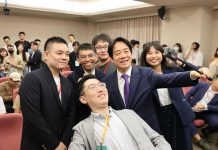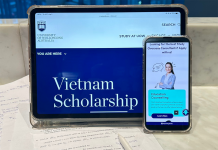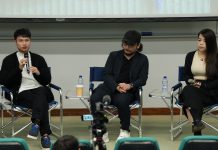Although parents like Woo have reservations about e-textbook learning, several schools in Hong Kong are vigorously pioneering e-textbooks as a medium of learning. One of them is Fung Kai Innovative School, Asia’s first Microsoft Innovative School.
The Sheung Shui primary school, which has around 700 students, was founded in 2008. The school’s new campus was built with a top quality IT infrastructure which was in place by the time the school opened. “We know if we want to widely push forward e-learning, we need to have quality hardware,” says Chan Yuk-sai, curriculum leader at the school. “Otherwise precious learning time would be wasted.”
Fung Kai students are required to buy a personal computer in Primary Two and the school installs the e-textbooks for them. Despite the widespread use of computers among the students, Chan says they do not have serious issues with their misuse. The school collects and inspects students’ devices every three months and often reminds students about IT ethics. Whenever they find any inappropriate apps, they delete them and inform the parents. The school also installs filtering software on every student’s computer to prevent them from visiting inappropriate websites. “Everything is neutral in itself. You could not blame the device if you could not use it properly,” says Chan. However, she adds the school cannot control students’ behaviour at home or their parents’ usage of the computers because of privacy considerations.

But what gives Chan a bigger headache is the shortage of IT talent among the workforce. With limited resources from the government, she says the school could only hire three technical support service officers (TSS) to support all the technical needs of teachers and students. The TSS staff and teachers have a huge workload but Chan is thankful for a sharing culture among the teachers who support each other on technical issues.
The sharing extends to the relationship between the school and some publishers. Fung Kai teachers design the animations, graphics and different applications that appear on e-textbooks produced by partner companies. The publishers charge them deeply discounted prices in return for their efforts in producing content for the e-textbooks.
In 2012, the Legislative Council Finance Committee approved a commitment of HK$50 million for the e-textbook Market Development Scheme (EMADS) to subsidise publishers to develop more e-textbooks. The long-term goal is to come up with an e-textbook list. More than 140 partner schools are currently using the e-textbooks developed by publishers who joined EMADS on a trial basis and provide feedback.
Thirteen publishers successfully joined the first phase of EMADS, including Open Knowledge Association Limited, a charitable e-textbook developer which sells Chinese and Putonghua e-textbooks at low prices to students who do not speak Chinese, have special education needs (SEN) or come from low-income families.
Melody Leung Lok-wan, the association’s business development manager says satisfying the demanding terms in EMADS is a huge challenge.
She says the hardest requirement is to make products that satisfy the needs of students with developmental dyslexia . They have to programme a function that provides voice-overs for every picture and sentence in the e-textbook. The time and costs of developing e-textbooks that can be used with different operating systems are also high. In total, 21 publishers successfully joined the EMADS in two phases but six dropped out from the scheme because of the difficulties and low profit margin.
Leung notes the Education Bureau (EDB) spends a lot of money on promoting e-textbooks, but the priority is to subsidise schools and students. “Schools and students always get the benefits first, and then comes the developers,” says Leung. She says the financial burden would be huge even if half of the development cost was covered by EMADS.
Still, she is optimistic about the future of the e-textbook industry as she thinks publishers find it easier to write and update e-textbooks. “You can foresee the form of education will be shifting to e-learning in the coming five years,” says Leung.






































